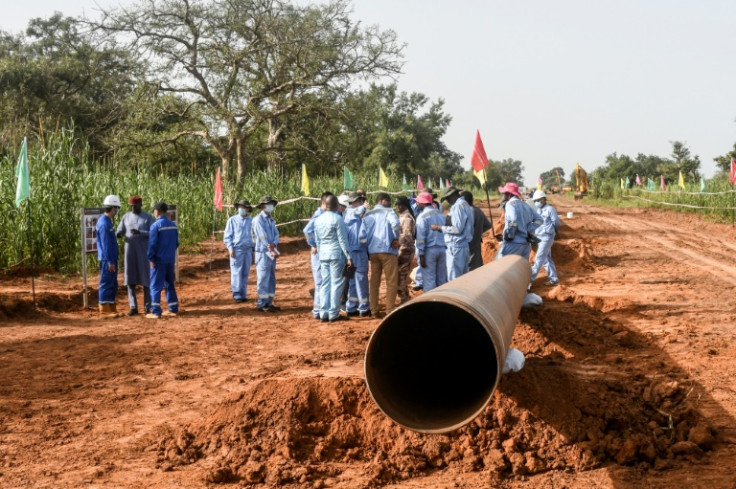EU Reshaping World's Fuel Markets; Bane Or Boon For Africa?

Just nine months ago, Europeans were lecturing African leaders on 'no gas' and urging them to go green. Now, they talk of a compromise because of the war, thousands of miles away in Eastern Europe. With the war in Ukraine, the narrative on energy has changed and the double standard has given Africa more bargaining power on energy deals.
In September, Andrzej Sebastian Duda, President of Poland, Russia's European Union (EU) neighbor, visited Senegal to seal gas deals. In May, Olaf Scholz, chancellor of Germany, the EU's largest economy, came calling to the West African nation to explore the possibility of developing new gas fields.
A high-level Italian team, comprising government ministers and executives from Eni, one of the largest energy firms in the world, went to Algeria, Angola and Congo and Mozambique, in April scouting for natural gas.
Eni is already getting ready with a natural-gas terminal to supply gas to Europe from Mozambique besides holding talks to operate an additional terminal in the South African nation.
Experts have estimated that Mozambique can earn in excess of $100 billion from its natural gas assets over the next 30 years.
By 2024, the state-owned Eni will double its imports from Algeria, which is connected to Italy by a pipeline across the Mediterranean Sea. In July 2022, Eni, American Occidental and French Total signed a $4 billion oil and gas production-sharing contract with Algeria's state-owned Sonatrach. The North African country currently exports about 83 percent of its gas to Europe, mainly to Italy and Spain.
Despite the Paris accord on climate change, the EU has no difficulties in using gas as energy as the largest trade body in the world declared fossil gas a transition fuel in July this year, calling it sustainable in regulations that guide investments. Gas and nuclear power plants will be added to the EU taxonomy rulebook from 2023, which will help investors label and market investments in them as green.
Russia, which supplies 40 percent of the energy needs of the European Union, wanted to explore oil and gas in Africa over the past years, but little has been achieved, giving room for the 27-member trade block to test the waters in Africa and reap rich dividends.
The talk in African capitals is that Europe's appetite to find alternatives to Russian natural gas will mean more money for gas facilities not just for export but for use at home.
African governments, in turn, are dispatching expert teams to Europe and the U.S. to announce the discovery of new oil and gas blocks just like Congo, which has embarked on an international marketing tour to U.S. and European companies.
Currently, a mere 6 percent of the world's fossil gas is generated in Africa and most of it is exported. From Nigeria to Egypt and Algeria to Mozambique, nations across the continent are all set to extract more gas - for Europeans and for them to burn.
Senegal will supply Germany with 2.5 million tons of gas from 2023 which will be hiked to 10 million tons by 2030. The West African nation is working with B.P. and Kosmos Energy, a U.S. company, to develop a gas field off its coast to start production next year. Mauritania is also planning to export liquefied natural gas (LNG) to Germany.
There is a plan to resurrect talks on the long-dormant trans-Saharan pipeline to supply natural gas to Europe from Nigeria via Niger, another country visited by the German chancellor during his African itinerary.
South Africa and Tanzania are home to untouched fields which are earmarked for development.
"Africa has woken up and we are going to exploit our natural resources," said Ruth Nankabirwa Ssentamu, Ugandan Energy Minister, ahead of the COP27 climate conference in Egypt on Nov. 5.
Natural gas, abundant in Africa, can create significant job opportunities and economic diversification and growth. The continent's vast yet untapped natural gas will come in handy as over 800 million people are living in energy poverty and 900 million are without access to clean cooking solutions. With Africa's population set to exceed 2.5 billion by 2050, energy generation capacity will need to be doubled by 2030.
As Europeans are scouting for gas in Africa, the 55-member African Union has risen to the occasion by adopting a common strategy to promote energy infrastructure. The African Energy Commission, the agency coordinating energy policy in the continent, has put more thrust on gas and nuclear to play a decisive role.
The dash for gas by European nations could likely result in a glut as supplies are set to increase by about five times the amount exported by Russia before the war, according to experts.
The International Energy Agency (IEA) said in its annual World Energy Outlook report that the energy market will witness extraordinary turbulence in the coming days.
Currently, the energy crisis has replaced the climate crisis as far as Europeans are concerned. As gas is used as a transition fuel by the EU, they will dump it once the path for green energy is put back on the burner.
Are Europeans putting African nations in the same development trap of the past yet again?
© Copyright 2025 IBTimes IT. All rights reserved.





















